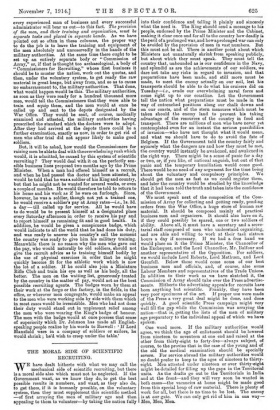THE MORAL SIDE OF SCIENTIFIC RECRUITING.
WE have dealt hitherto with what we may call the mechanical side of scientific recruiting, but there is a moral side also which must not be neglected. If the Government want, as we know they do, to get the best possible results in numbers, and want, as they also do, to get them, if it is humanly possible, on the voluntary system, then they must supplement this scientific method —of first arraying the men of military age and then appealing to them to volunteer—by taking the nation fully into their confidence and telling it plainly and sincerely what the need is. The King should send a message to his people, endorsed by the Prime Minister and the Cabinet, making it clear once and for all to the country how deadly is the peril of a prolonged war, and how a prolonged war can only be avoided by the provision of men in vast numbers. But this must not be all. There is another point about which Ministers not unnaturally shrink from speaking publicly, but about which they must speak. They must tell the country that, unbounded as is our confidence in the Navy, and splendid as are the achievements of our soldiers, we dare not take any risks in regard to invasion, and that preparations have been made, and still more must be made, to meet the enemy actually on our soil, lest his transports should be able to do what his cruisers did on Tuesday—i.e., evade our overwhelming naval force and come right up to our coastline. Let the Government tell the nation what preparations must be made in the way of entrenched positions along our chalk downs and on our coasts, and of the stern measures which must be taken should the enemy land to prevent his taking advantage of the resources of the country in food and transport. There are millions of men who have never yet contemplated even for an instant the serious possibilities of invasion—who have not thought what it would mean, and what we should have to do to avoid the fate of Belgium. If the Government told the country fairly and squarely what the dangers are and how they must be met, the country would instantly be awakened, and awakened in the right way. There might be a sense of panic for a day or two, or, if you like, of national anguish, but out of that panic and the temporary humiliation would come good. There would be no need of any argument for the time being about the voluntary and compulsory principles. We should get the men as fast as we could register them, and later the country would be steadied by the knowledge that it had been told the truth and taken into the confidence of the Government.
We must speak next of the composition of the Com- mission of Array for collecting and getting ready, pending orders from the War Office, a huge store of human raw material. It should be composed mainly of practical business men and organizers. It should also have on it, if they could possibly be spared, one or two soldiers of ability. Above all, it must have a secretary and a secre- tarial staff composed of men who understand organizing, and are able and willing to work at their task sixteen hours a day if necessary. If we had a free hand we would place on it the Prime Minister, the Chancellor of the Exchequer, and the Lord Chancellor, Mr. Balfour and another representative of the Opposition. For soldiers, we would include Lord Roberts, Lord Methuen, and Lord G-renfell. Below these would come some of our best business men and officials, and, of course, also some Labour Members and representatives of the Trade Unions. In addition to their work as we have sketched it, the Commission of Array should take over the Press advertise- ments. Hitherto the advertising appeals for recruits have been anything but scientific. Frankly, they have been very poor specimens of the art. If proper use were made of the Press a very great deal might be done, and done quickly. A good scientific Press campaign might very well fill the gap while the Commission was arraying the nation—that is, getting the lists of the men of military age preparatory to the individual appeal of which we have spoken.
One word more. If the military authorities would agree, we think the age of enlistment should be lowered from nineteen to seventeen at one end and raised at the other from thirty-eight to forty-five—always subject, of course, to the proviso that in the case of the young and of the old the medical examination should be specially severe. For service abroad the military authorities would no doubt prefer to keep to the ages of nineteen to thirty- eight. Men attested under nineteen or over thirty-eight might be detailed for filling up the gaps in the Territorial units. As the drafts go out to the Territorials in India and at the front—and they will very soon be wanted in both cases—the vacancies at home might be made good from this special heap of raw material. There is plenty of work for all, but there is no time to be lost. The enemy is at our gate. We can only get rid of him in one way— Men, Men, Men.














































 Previous page
Previous page